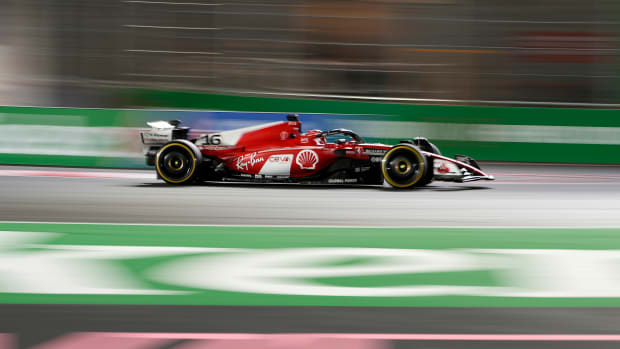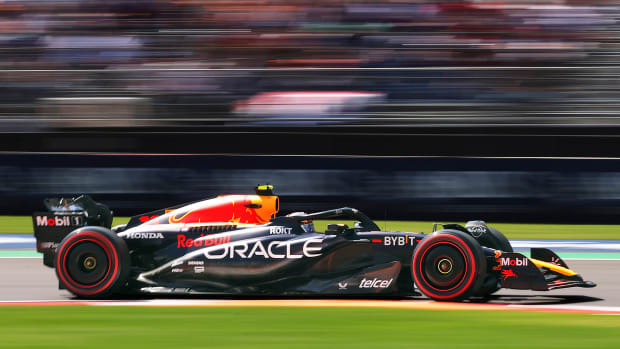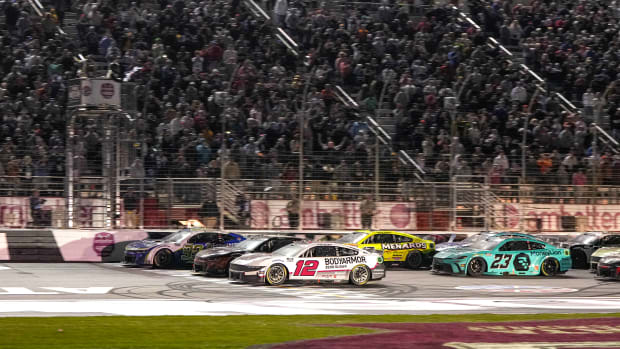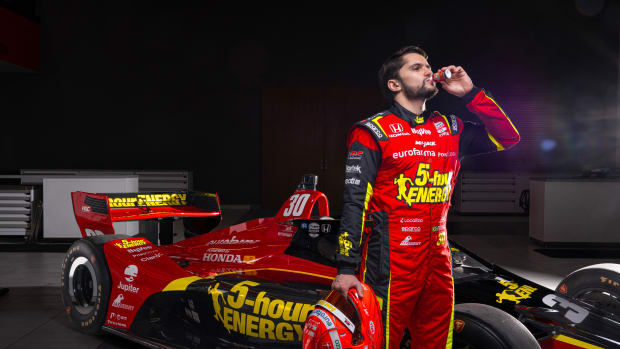Consulting group: Family told to keep IndyCar, IMS

"BCG has produced many documents, including an early version of a document that is the subject of several news reports today, that include suggested elements for the plan," BCG CEO Mark Miles said.
Jeff Haynes/Reuters
(AP) -- The Hulman-George family should retain ownership of the IndyCar Series and Indianapolis Motor Speedway, according to a report from a consulting group it hired to evaluate business operations, including running the Indianapolis 500.
The Boston Consulting Group offered a wide array of suggestions on how to better position the troubled open-wheel series and historic speedway in a 115-page report, a copy of which was obtained by The Associated Press.
Among the ideas: a 15-race IndyCar schedule in major American cities held over 19 weeks; a three-race playoff with a season finale on the road course at Indy; a new marketing strategy promoting IndyCar's "daredevil drivers"; using just one U.S. television partner instead of both ABC/ESPN and NBC Sports Network; overhauling the ticket pricing at IMS in tiers that would raise the cost of the most expensive Indy 500 ticket from $150 to $200 and lower almost every ticket for the Brickyard 400 and Red Bull Grand Prix.
Hulman & Co. is under no obligation to follow the suggestions, but Hulman & Co. CEO Mark Miles said in a statement late Friday night the company is taking the report under advisement.
"The work BCG has done provides conversation points around several important areas of our business as we shape our thinking about the future, but our strategy has not yet been finalized," Miles said in his statement.
"As part of finalizing our strategy, we will be sharing information with our stakeholders and listening to their feedback and ideas before we come to any final conclusions. We are in the early stages of this process and will be communicating to our stakeholders and fans as we define our strategy for the future."
Miles also indicated in his statement that the version of the report the AP reviewed was one of many documents that was continuously updated during a lengthy process.
"BCG has produced many documents, including an early version of a document that is the subject of several news reports today, that include suggested elements for the plan," Miles said.
"BCG examined many important questions throughout this process, including how to define our overall brand, how our motorsports properties can attract more fans, how we can make our races more appealing to television viewers and live audiences, and how we can help our teams, partners and other stakeholders be more financially successful because of our relationship."
The consulting firm was hired at the end of last season, which many considered to be one of the best in terms of on-track competition. But boardroom politics and IndyCar's history of dysfunction overshadowed the racing and American driver Ryan Hunter-Reay's championship.
Randy Bernard was ousted as CEO in late October in what many fans viewed as a coup by power-hungry team owners and IndyCar founder Tony George, who made a late season play to buy back the open-wheel series.
Since then, Miles, who most recently led Indianapolis' successful Super Bowl effort, has been brought in as CEO of Hulman & Co. and is charged with hiring Bernard's replacement. Jeff Belskus, the former CEO, is filling in for Bernard in the interim.
With the March 24 season opener approaching and the series still lacking stability, auto racing observers were awaiting the report. However, it offered no quick fixes.
BCG said IndyCar was "the best pure racing motorsports league in the U.S. ... but the series suffers from lack of awareness."
Part of its problem is that a significant amount of the 14 million fans who watch the Indianapolis 500 don't watch another race during the season.
Focus groups suggested that marketing strategies should be geared to "positioning IndyCar as having the most skilled, daredevil drivers and not theatrical off-track personalities."
They indicated they valued fast cars over science and engineering; winning over points challenges; suspense through lead changes over entertainment through crashes; and the diversity of track types rather than ovals.
"Focus on excitement of real racing; daredevil drivers defined by winning, racing at thrilling speeds," the report said, as a way to distinguish IndyCar from NASCAR's "amusing entertainment: off-track drama and partying."
The report also suggested:
- IndyCar should split the schedule into two seasons - a 15-race U.S. calendar from April to August and an international series during the offseason. The championship would be decided during the U.S. season, and the hypothetical schedule proposed by BCG included seven cities not currently visited by IndyCar. It opened at Houston, then Phoenix, the Indy 500, Miami, Atlanta, Boston, Chicago, Pocono, Toronto, Seattle, Sonoma and Fontana. The "playoffs" portion included Texas, Long Beach and the Indy road course. BCG argued for a playoff because "the current IndyCar schedule lacks consequence and the television ratings are at the lowest at the end of the season because the series does not have a mechanism to create suspense."
- One television partner, preferably ABC/ESPN, or placing as many races as possible on ABC. The report also suggested the NBC Sports Network may be in violation of its contract with IndyCar if it promotes any other motorsports series more than IndyCar. NBCSN will broadcast Formula One this year, but the promotional clause in the contract pertains only to the cable channel and not network television. The report said NBCSN has indicated it would "release the series from the deal" because the rights fees increase from $5.5 million this year to $10 million in 2018 when the contract expires. But NBCSN has indicated it's happy with the IndyCar deal and wasn't interested in ending the relationship early.
- IndyCar should reduce the Leaders' Circle subsidy payments to teams and redirect the funds into a weekly purse based on performance. Under the current model, the league is giving teams a $1.1 million subsidy and race winners are earning just $35,000 per victory. BCG offered several different models, including one that shifted half of Leader's Circle money into prize money and upped the race winner payout to a minimum $240,000 per victory.
- Using Indianapolis Motor Speedway more. BCG Found that of the 132 days the track was used in 2012, only 21 were considered major revenue-generating events. By using the speedway for an IndyCar race on the road course, BCG found IMS had the potential to generate a $4.3 million profit.
- Resetting ticket price tiers: BCG found that IMS didn't really differentiate between high-end and low-end ticket pricing. The report targets Indy 500 ticketing, suggesting penthouse and deck tickets should be raised from $150 to $200, paddock seats from $90 to $150. Other seats should drop anywhere from $5-$20 and sometimes more.





